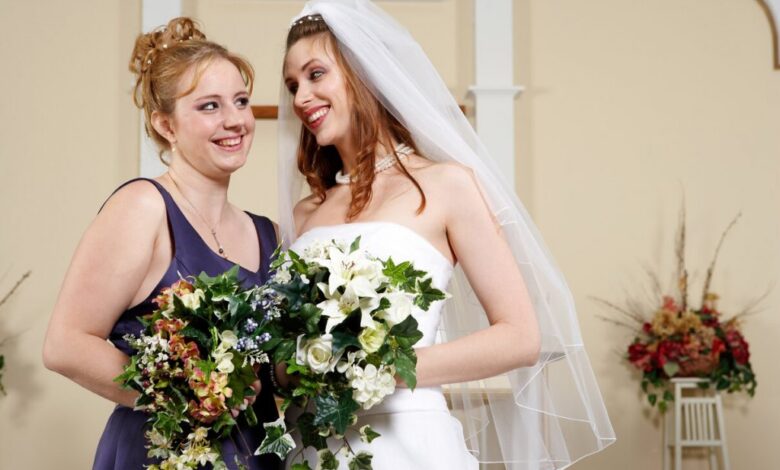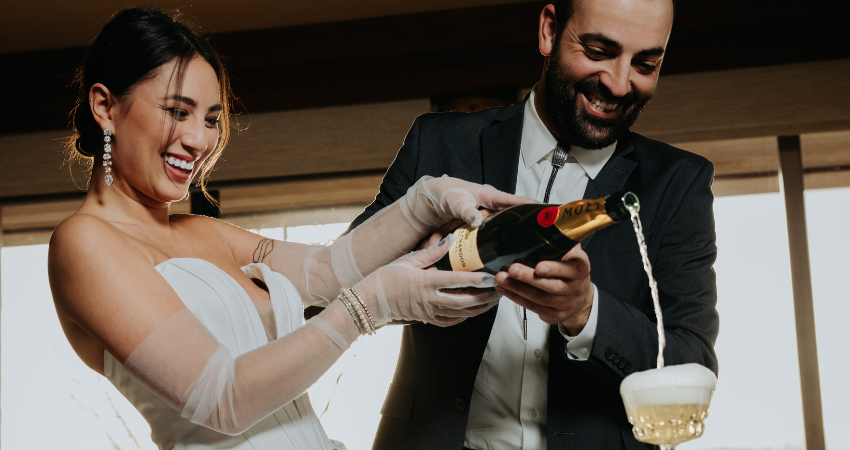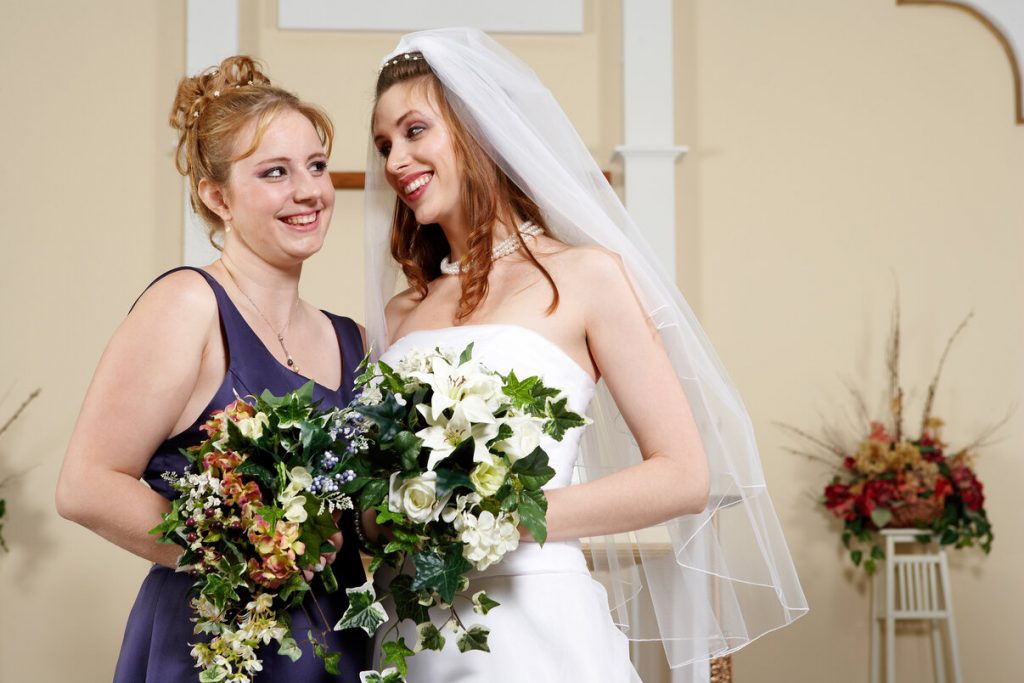
A guide to being the maid of honor at a wedding provides a comprehensive look at the responsibilities, planning, and relationships involved in this significant role. From coordinating bachelorette parties to managing the wedding day schedule, this guide offers practical advice for every step of the journey, ensuring a smooth and memorable experience for the bride and the entire wedding party.
This in-depth look covers everything from the crucial relationship with the bride, handling finances and gifts, to the critical wedding day tasks and even maintaining the post-wedding bond with the bride and bridesmaids. It provides clear expectations and strategies for navigating the challenges that may arise during this special time.
Responsibilities of a Maid of Honor
Being a maid of honor is a significant role in a wedding, demanding a blend of support, organization, and emotional intelligence. You’re not just another bridesmaid; you’re a trusted confidante and key player in ensuring the bride’s happiness and the success of the big day. This guide delves into the typical duties and expectations, differentiating them from other bridesmaids’ roles, to help you excel in this important position.
Typical Maid of Honor Responsibilities
The maid of honor is typically the closest friend or family member to the bride. This close relationship often translates into a broader range of responsibilities compared to other bridesmaids. Their role extends beyond simple tasks; it encompasses emotional support and practical assistance to the bride.
| Task | Description | Estimated Time Commitment |
|---|---|---|
| Planning & Coordination | This involves assisting with the planning of the bachelorette party, helping with the wedding party’s attire, and often organizing the wedding weekend. This may include coordinating RSVPs, booking venues, and handling potential issues as they arise. | Variable, depending on the scale of the wedding. Could range from several hours per week to several days leading up to the wedding. |
| Bride’s Emotional Support | The maid of honor acts as a sounding board, offering advice, support, and encouragement to the bride throughout the planning process. This may involve emotional support during stressful moments, providing a listening ear, and offering reassurance. | Ongoing throughout the engagement and leading up to the wedding; this isn’t a finite time commitment. |
| Bridesmaids’ Coordination | Assisting with tasks such as scheduling fittings, ensuring all bridesmaids are on the same page, and addressing any concerns or questions. This may involve delegating tasks and managing expectations. | Variable, depending on the number of bridesmaids and the complexity of the coordination. |
| Wedding Day Management | On the wedding day, the maid of honor helps the bride with last-minute tasks, ensuring the ceremony and reception run smoothly. This may involve helping the bride with her dress, ensuring the bridesmaids are in place, and addressing any unforeseen problems. | Several hours, potentially more if there are significant issues. |
| Guest Management (potentially) | Sometimes the maid of honor helps with receiving guests or managing the flow of the reception. | Variable, depending on the wedding’s setup and the level of assistance needed. |
Distinguishing Maid of Honor Duties from Other Bridesmaids
While all bridesmaids play an important part in supporting the bride, the maid of honor’s role typically involves a higher level of responsibility and involvement. Other bridesmaids may focus on specific tasks such as flower arrangements, or specific areas of the reception. The maid of honor’s responsibilities are more comprehensive, encompassing the bride’s emotional well-being and the overall success of the wedding events.
So, you’re the maid of honor? A guide to nailing this role is essential! From planning the bachelorette party to crafting the perfect speech, there’s a lot to juggle. Plus, you want to look fabulous, right? Checking out the style of some of the best-dressed stars, like Jenna Ortega, Sydney Sweeney, and Britt Lower, from 10 best dressed stars jenna ortega sydney sweeney britt lower , can give you some seriously stylish inspo for your own wedding-related events.
Ultimately, a well-organized approach is key to being the amazing maid of honor everyone will remember!
Additional Helpful Tasks
There are additional tasks that a maid of honor might take on, even if they aren’t explicitly expected.
- Creating a “Wedding Survival Kit” for the bride, containing essentials like a small first-aid kit, pain relievers, and personal care items. This is a thoughtful gesture that can ease the bride’s mind on the wedding day.
- Handling Gift Organization, such as keeping track of the wedding gifts or arranging for a gift table if required.
- Assisting with the Bachelorette Party Planning, including coordinating activities, venue bookings, and managing guest lists.
- Supporting the Bride’s Final Preparations, including assisting with last-minute errands or helping with packing for the honeymoon.
Planning and Organization
Being the maid of honor involves more than just emotional support; it also requires meticulous planning and organization. A successful wedding-related event, whether a bachelorette party, bridal shower, or rehearsal dinner, hinges on careful coordination and execution. This section will delve into the practical aspects of planning, from initial brainstorming to final execution, empowering you to seamlessly navigate these crucial events.
Planning a Wedding-Related Event
Effective planning requires a systematic approach. Begin by clearly defining the event’s purpose and desired atmosphere. Consider the bride’s preferences, the overall wedding theme, and the personalities of the attendees. This initial step lays the foundation for all subsequent decisions. Once the vision is established, create a timeline to track tasks and deadlines.
A well-defined timeline ensures that each aspect of the event is addressed within a specific timeframe, preventing last-minute anxieties. Detailed planning allows for proactive adjustments and problem-solving.
Coordinating with Other Bridesmaids and Vendors
Open communication is key when coordinating with bridesmaids. Establish clear roles and responsibilities for each bridesmaid. This prevents overlapping efforts and ensures that each bridesmaid feels involved and valued. A shared online platform (like a dedicated Google Doc or group chat) can be a powerful tool for communication. Vendors should also be contacted promptly and regularly to maintain clear communication.
Confirming details, such as venue availability and catering options, should be done well in advance. Schedule regular check-ins to track progress and address any concerns. Maintain a positive and collaborative attitude to keep the entire process running smoothly.
Budgeting and Resource Management
Managing a wedding-related event’s budget requires careful estimation and tracking. Create a detailed budget outlining expected costs for venue rentals, catering, entertainment, decorations, and other miscellaneous expenses. A realistic budget helps avoid overspending and ensures that funds are allocated effectively. Look for opportunities to reduce costs, such as opting for DIY decorations or selecting affordable entertainment options.
Track expenses meticulously to monitor spending against the budget. Explore options for potential sponsorships or discounts. These measures can significantly enhance budget management.
Maid of Honor Checklist, A guide to being the maid of honor at a wedding
This checklist serves as a practical guide to ensure all tasks are completed efficiently and effectively. It’s crucial to stay organized and manage time wisely during this crucial stage.
- Initial Planning: Define the event’s purpose, guest list, and budget; secure the venue and caterer; select vendors.
- Communication: Establish clear roles for bridesmaids; create a shared communication platform; confirm with vendors.
- Guest Management: Send invitations, collect RSVPs, and finalize guest lists; plan seating arrangements (if applicable).
- Logistics: Coordinate transportation, entertainment, and other logistical details; prepare any necessary supplies.
- Execution: Oversee all event details; ensure smooth transitions; manage any issues that may arise.
- Post-Event: Collect feedback from attendees; gather vendor information; send thank-you notes.
Planning Methods Comparison
Choosing the right approach to event planning is crucial for success. The comparison below highlights different methods for planning wedding-related events.
| Method | Description | Pros | Cons |
|---|---|---|---|
| DIY | Taking on all aspects of planning and execution independently. | Greater control over every detail; potential cost savings. | Requires significant time commitment; potential for errors if not well-organized. |
| Hiring Professionals | Outsourcing various tasks to specialized vendors. | Reduces workload; ensures expertise and efficiency; potential for better quality. | Increased costs; less direct control over every detail. |
DIY planning allows for personalized touches but can be demanding. Professional planning can provide expert assistance but might involve higher costs.
Relationship with the Bride
Being the maid of honor means more than just attending events and fulfilling responsibilities; it’s about fostering a deep and supportive connection with the bride. This relationship is crucial throughout the wedding planning process and beyond. A strong bond between the maid of honor and the bride creates a foundation of trust and understanding, which is essential for navigating the often-complex and emotional journey of wedding planning.The maid of honor acts as a critical sounding board and support system for the bride.
This dynamic is multifaceted, encompassing everything from offering practical advice to providing emotional comfort. It’s about being a reliable friend, a confidante, and a partner in the process. This dynamic is crucial for ensuring the bride feels supported and empowered throughout the wedding planning.
Planning a wedding as a maid of honor can be super stressful, but a helpful guide can make things much easier. You’ll need to navigate everything from coordinating the bachelorette party to ensuring the bride’s big day runs smoothly. This is a key role that requires careful planning and attention to detail. It’s worth checking out how Anjelica Huston handled her role in the “Towards Zero” Britbox interview, anjelica huston towards zero britbox interview , for some insights on navigating tricky situations.
Ultimately, a well-structured guide is your best friend in navigating this demanding but rewarding role.
Importance of a Positive Relationship
A positive relationship between the maid of honor and the bride is paramount. This supportive bond allows the bride to feel comfortable sharing her vision, concerns, and hopes for her special day. The maid of honor’s role is not just to participate in the festivities but also to be a steadfast presence offering unwavering encouragement and understanding. This understanding is crucial to navigating potential conflicts and challenges.
Dynamics Between Maid of Honor and Bride
The relationship between the maid of honor and the bride is a unique blend of friendship and responsibility. It’s a partnership built on mutual respect, shared values, and a common goal: to support the bride in creating a memorable and perfect wedding day. The maid of honor should understand that the bride’s needs and desires are paramount, and prioritize her well-being and happiness throughout the process.
Potential Conflicts and Resolution Strategies
Conflicts, though not always inevitable, can arise. These could include differing opinions on wedding details, scheduling conflicts, or even unspoken resentments. Honest communication is key. If disagreements arise, the maid of honor and the bride should strive to communicate openly and respectfully. Active listening and a willingness to compromise are essential for resolving any conflicts.
For example, if there’s a disagreement about the wedding dress, a calm discussion about the pros and cons of each option can lead to a mutually acceptable solution.
Emotional Support
The maid of honor plays a vital role in providing emotional support to the bride. Wedding planning can be stressful, and the bride may experience anxieties, fears, or doubts. The maid of honor should be a source of comfort, encouragement, and reassurance. Offering a listening ear, a shoulder to cry on, and words of affirmation can make a significant difference in the bride’s emotional well-being.
Maid of Honor as a Close Friend and Confidante
The maid of honor’s role mirrors that of a close friend and confidante. This role involves being a trusted advisor, a source of practical support, and someone the bride can rely on for honest feedback and encouragement. A strong relationship built on trust and understanding is essential for navigating the wedding planning process successfully. This bond allows the bride to feel safe sharing her concerns and emotions without judgment, fostering a supportive environment where both individuals can thrive.
Gifts and Finances: A Guide To Being The Maid Of Honor At A Wedding
Being a maid of honor is a significant role, and navigating the often-unclear waters of gifts and finances can be tricky. Understanding the expectations and responsibilities surrounding these matters will ensure a smooth and enjoyable experience for everyone involved. This section delves into the delicate balance of gift-giving etiquette, financial contributions, and the importance of clear communication.The wedding day is a celebration of the couple’s journey, and the maid of honor plays a key part in ensuring it’s a memorable event for everyone.
Managing expectations and contributing thoughtfully to the celebration, including financial aspects, helps avoid misunderstandings and fosters a supportive environment for the bride and wedding party.
Common Gift Expectations
Understanding the typical expectations surrounding gifts is crucial. While gifts are meant to be thoughtful tokens of affection, they often come with implicit expectations that the maid of honor should be aware of. A common assumption is that the maid of honor will contribute more significantly than other members of the wedding party. This can lead to pressure and the feeling of obligation.
Appropriate and Inappropriate Gifts
Navigating the gift-giving landscape requires a delicate touch. Consider the bride’s personality and the overall tone of the wedding when choosing a gift. A thoughtful gift reflects consideration and a genuine desire to celebrate the couple. Examples of appropriate gifts include personalized items, experiences, or contributions to a honeymoon fund. Inappropriate gifts might include items that are too personal, too expensive, or simply not in line with the bride’s style.
Financial Contributions
Financial contributions to the wedding are a common practice, and the maid of honor should be prepared to discuss these expectations with the bride. These contributions can range from contributing to the wedding registry to assisting with the honeymoon fund or other wedding-related expenses.
Handling Requests for Contributions
Open communication is key. If the bride or other members of the wedding party request financial contributions, it’s essential to discuss the expectations and establish clear guidelines for contributions. A shared understanding ensures everyone feels comfortable and valued. Avoid any perceived obligation by establishing expectations early in the planning process.
Gift-Related Tasks
The maid of honor often takes on various gift-related tasks. These tasks include managing the gift registry, ensuring gifts are appropriately received and acknowledged, and coordinating gift card exchanges. The gift registry management process involves keeping track of the gifts, confirming the delivery and acknowledging the gifts.
Gift Registry Management
Managing the gift registry is a key task. This involves actively monitoring the registry, keeping track of items purchased, and ensuring the bride receives the gifts promptly. It’s also essential to understand the process for exchanging gift cards.
Gift Opening
The gift opening is a significant moment for the couple. The maid of honor can help ensure the process is organized and respectful, creating a pleasant and memorable experience.
Gift Card Exchanges
Gift cards can be a common wedding gift, and the maid of honor can play a crucial role in managing and exchanging these cards. This involves coordinating the collection and exchange of gift cards, ensuring everyone is acknowledged and thanked for their contribution.
Preparing for the Wedding Day

The wedding day is a whirlwind of activity, and being the maid of honor means you’re at the heart of it all. Successfully navigating the day requires meticulous planning and a calm, organized approach. This section will detail the essential tasks you need to complete before the big day, emphasizing time management and strategies for staying composed amidst the chaos.
Pre-Wedding Day Tasks
To ensure a smooth wedding day, tackling tasks well in advance is crucial. These tasks are critical for minimizing stress and maximizing your ability to support the bride and other members of the wedding party. The key is to prioritize, delegate, and plan ahead.
- Confirm details with the bride and vendors: Double-check all RSVPs, vendor contact information, and any last-minute changes. Confirm the exact locations of the ceremony and reception, as well as the timetables for events.
- Finalise attire and accessories: Ensure all bridesmaids’ outfits match and are ready to be worn. Coordinate accessories and any necessary alterations.
- Prepare emergency kits: Have a small bag with essentials for the bride, including pain relievers, allergy medications, and any personal items she might need. This is crucial for maintaining calmness during the wedding ceremony.
- Confirm transportation arrangements: Coordinate transport for bridesmaids, ensuring everyone gets to the venue on time and safely. Plan routes and backup options in case of traffic delays.
- Set up a communication system: Agree on a way to communicate during the wedding day. This might involve a dedicated phone or a WhatsApp group to relay important information.
Time Management on Wedding Day
The wedding day is a marathon, not a sprint. Effective time management is key to keeping the day on track and ensuring you’re available to assist the bride and other members of the wedding party. Planning ahead and delegating tasks will help alleviate the stress of a busy schedule.
- Create a schedule: Develop a detailed timeline for the day, outlining the sequence of events and allocating time for each task. This is vital to avoid delays.
- Prioritize tasks: Identify crucial tasks that require your immediate attention and delegate less important ones to others. This allows for flexibility and helps to focus on the most essential elements.
- Build in buffer time: Account for unexpected delays. Scheduling extra time between events allows for contingencies and avoids rushing.
Staying Calm and Organized
Maintaining composure and organization is essential. Deep breaths and a positive attitude will help you navigate the day’s challenges with grace. Having a well-structured plan is crucial.
- Visual aids: Prepare a visual schedule with key times and locations. Use a whiteboard, a large notepad, or a digital document to keep track of events.
- Delegate tasks: Don’t try to do everything yourself. Delegate tasks to other bridesmaids or family members to alleviate the pressure.
- Mindfulness and self-care: Take breaks and moments for yourself. Prioritizing self-care will ensure you can support the bride and other members of the wedding party effectively.
Delegation Strategies
Sharing the workload is a key aspect of wedding planning. Delegating tasks to other bridesmaids and family members ensures that everyone can focus on their roles without feeling overwhelmed.
- Assign specific tasks: Assign specific responsibilities to different bridesmaids, like arranging bouquets, managing decorations, or assisting with the ceremony.
- Check-in regularly: Communicate frequently with the delegated individuals to ensure tasks are being handled efficiently.
- Provide clear instructions: Give clear instructions and expectations for each task to ensure everyone is on the same page.
Maid of Honor’s Wedding Day Schedule
| Time | Task | Estimated Time |
|---|---|---|
| 7:00 AM – 8:00 AM | Get ready and breakfast | 60 minutes |
| 8:00 AM – 9:00 AM | Final checks with the bride and bridesmaids | 60 minutes |
| 9:00 AM – 11:00 AM | Assist the bride with final preparations | 120 minutes |
| 11:00 AM – 12:00 PM | Wedding ceremony | 60 minutes |
| 12:00 PM – 1:00 PM | Reception setup assistance | 60 minutes |
| 1:00 PM – 2:00 PM | Lunch and relaxation | 60 minutes |
| 2:00 PM – 5:00 PM | Reception activities, support to the bride | 180 minutes |
| 5:00 PM – 6:00 PM | Cocktail hour and mingling | 60 minutes |
| 6:00 PM – 11:00 PM | Reception, speeches, dancing, and farewell | 5 hours |
Wedding Day Responsibilities
The wedding day is a whirlwind of emotions and activities, and the Maid of Honor plays a crucial role in ensuring a smooth and joyous experience for the bride. Beyond the pre-wedding preparations, the day itself demands a high level of support, organization, and grace. From the ceremony to the reception, the Maid of Honor must be prepared to navigate the unexpected and maintain a positive, supportive atmosphere.
Ceremony Duties
The Maid of Honor’s role during the ceremony is multifaceted and essential to the bride’s experience. She’s often involved in helping the bride with last-minute adjustments, ensuring her composure, and keeping the ceremony on schedule. This includes being present to offer support and guidance throughout the entire process, especially as the bride walks down the aisle.
- Walking down the aisle: The Maid of Honor often walks beside the bride as she processes down the aisle. This role is both a source of support and a moment of shared joy. The Maid of Honor provides reassurance and helps the bride maintain her composure, especially if there are emotional moments or unexpected delays. The Maid of Honor should be aware of the bride’s preferences for the ceremony and her comfort level during this crucial part of the ceremony.
So, you’re the maid of honor? That’s a huge responsibility! A good guide will help you navigate all the tasks, from planning the bachelorette party to helping the bride with last-minute details. But while you’re busy organizing, don’t forget to treat yourself! Consider investing in some stylish and practical wallets for women, like the ones featured on this site best wallets for women.
A beautiful wallet will be a perfect way to keep your essentials organized and will also help you look put together while you’re busy keeping the wedding running smoothly. And don’t forget, being a great maid of honor is about more than just the perfect purse!
This might include offering a gentle nudge or a reassuring smile, depending on the bride’s temperament.
- Giving the toast: The Maid of Honor’s toast is an opportunity to highlight the bride and groom’s relationship, their unique qualities, and their shared journey. It’s a chance to express heartfelt congratulations and well wishes for the future. This requires careful consideration of the bride and groom’s relationship dynamics and the overall tone of the reception. A well-crafted toast can be a highlight of the entire ceremony and reception.
- Other duties: Beyond the walking down the aisle and the toast, the Maid of Honor may be responsible for specific tasks, like managing the bouquets of the bridesmaids, ensuring that the recessional is on schedule, or providing support to the wedding party members.
Reception Responsibilities
The reception is where the party truly comes alive, and the Maid of Honor plays a pivotal role in ensuring the bride’s comfort and enjoyment. The Maid of Honor’s presence is vital in helping to manage the flow of the reception, making sure everything runs smoothly, and ensuring the bride is supported throughout the evening.
- Maintaining the atmosphere: The Maid of Honor is responsible for maintaining a positive and supportive atmosphere for the bride and wedding party. This includes anticipating potential issues, managing the flow of conversations, and ensuring that everyone is having a good time.
- Supporting the bride: The Maid of Honor should be attentive to the bride’s needs and comfort level. This may include taking over some responsibilities, such as managing conversations or ensuring she has a drink. The Maid of Honor should act as a calming presence for the bride throughout the reception, especially during moments of stress or anticipation.
- Managing unexpected situations: The Maid of Honor should be prepared for unexpected situations, like a misplaced item or a guest with a specific need. A calm and collected approach is key in resolving these issues, ensuring the bride feels supported and in control.
Handling Unexpected Situations
Wedding days are often unpredictable. The Maid of Honor’s role extends to helping manage these situations with grace and professionalism. Anticipating potential issues and having a plan in place can greatly reduce stress and ensure a positive experience.
- Addressing guest concerns: A guest might have a question or need assistance. The Maid of Honor should be prepared to offer help or direct them to the appropriate person, ensuring the guest’s needs are met without disrupting the flow of the wedding.
- Responding to mishaps: Something might go wrong. Maintaining a calm demeanor, working with the wedding party or other staff to address the issue, and ensuring the bride remains composed are essential to a smooth experience.
Supporting the Bride’s Flow and Details
The Maid of Honor’s role isn’t just about logistics; it’s about actively supporting the bride’s emotional well-being and ensuring her comfort throughout the entire wedding day.
- Staying connected: The Maid of Honor can stay in close contact with the bride throughout the day, offering support and reassurance. She can be a calming presence and help the bride navigate the day’s various events.
- Anticipating needs: By understanding the bride’s preferences and anticipated needs, the Maid of Honor can proactively address potential issues. This could involve ensuring the bride has a moment to relax, arranging for specific requests, or handling small tasks.
After the Wedding
The wedding day is just the beginning of a beautiful journey for the bride and groom. As the maid of honor, your role extends beyond the ceremony and reception; it’s about nurturing the relationships you’ve built and supporting the happy couple as they embark on their new chapter. Maintaining a connection with the bride and the rest of the wedding party after the wedding is vital for fostering lasting friendships and memories.The wedding festivities might fade, but the bonds forged during the planning and celebration should continue to thrive.
Showing continued support and care for the bride and the other members of the wedding party is a testament to your genuine care and friendship. This period allows for a chance to strengthen your connections and solidify the memories created.
Maintaining the Relationship with the Bride and Wedding Party
A key aspect of a maid of honor’s role after the wedding is continuing the supportive connection with the bride and the rest of the wedding party. This involves remembering the bride’s and other bridesmaids’ individual needs and personalities, and adapting your interactions accordingly. Showing genuine interest in their lives, even after the wedding is over, is crucial for maintaining a strong bond.
Expressing Gratitude to the Bride and Wedding Party
Expressing gratitude to the bride and the other members of the wedding party demonstrates appreciation for their contributions to the wedding and strengthens the bonds you share.
- Personalized Thank-You Notes: Sending heartfelt thank-you notes, ideally personalized for each person, is a thoughtful way to show appreciation for their gifts, support, and involvement. The note should reflect a specific detail about the person’s contribution, whether it was their helpful advice, a shared memory, or a thoughtful gesture.
- Follow-Up Calls or Texts: A quick call or text a few weeks after the wedding can make a huge difference. Check in with the bride to see how she’s settling into married life and to express continued support. A friendly check-in can be a wonderful way to keep the relationship strong.
- Group Gathering: Organizing a small gathering or get-together with the wedding party can be a fun way to reconnect and celebrate the new chapter in the bride’s life. This could be a casual lunch, a coffee date, or an evening out. A group gathering gives everyone the opportunity to share experiences, updates, and continue to bond.
Supporting the Bride’s Transition to Married Life
The transition to married life can be exciting but also challenging. As the maid of honor, offering support and understanding is key to helping the bride navigate this new chapter.
- Offer Practical Help: A simple gesture like offering to help with household tasks or errands can show your support. This can be a wonderful way to offer assistance during a busy time.
- Active Listening: Listen attentively to the bride’s thoughts and feelings as she adjusts to married life. Active listening and understanding can strengthen your bond and provide support during the transition.
- Celebrating Milestones: Celebrate the bride’s milestones in her new life, such as anniversaries, new homes, or baby announcements. This demonstrates your continued care and connection with her. Celebrating these moments can further solidify the bond you share.
Maintaining a Strong Bond with the Bride and Bridesmaids
Maintaining a strong bond with the bride and bridesmaids after the wedding involves consistent communication and effort. Regular contact, shared experiences, and a genuine interest in each other’s lives are crucial for keeping the friendships strong.
- Regular Check-Ins: Scheduling regular check-ins, whether through phone calls, video chats, or social media, can keep the communication lines open and maintain the bond with the bride and bridesmaids. These regular check-ins can make a difference.
- Shared Activities: Organize activities that everyone enjoys, such as a girls’ weekend getaway, a movie night, or a fun outing. These shared experiences can help maintain the bonds formed during the wedding planning and celebration phase.
- Supporting Each Other’s Goals: Supporting each other’s individual goals and endeavors shows your commitment to the friendship and provides an opportunity to continue to bond over personal interests.
Staying Connected with the Wedding Party
Maintaining contact with the wedding party after the wedding is crucial for fostering long-lasting friendships. Regular communication, shared activities, and mutual support are key components in ensuring a strong connection.
- Social Media Groups: Creating a dedicated social media group for the wedding party allows for consistent updates, shared memories, and a platform for continued communication. Social media groups can be a valuable tool to keep everyone connected.
- Shared Memories: Share wedding photos, videos, and other memories with the wedding party to keep the celebration alive and maintain the connections. Sharing these memories can help strengthen bonds.
Ultimate Conclusion

Being a maid of honor is a unique opportunity to support your friend through a momentous occasion. This guide offers a roadmap to navigate the planning process, manage responsibilities, and foster a strong bond with the bride and the entire wedding party. Ultimately, it’s about celebrating the bride’s special day while maintaining a positive and supportive presence throughout the entire journey.





